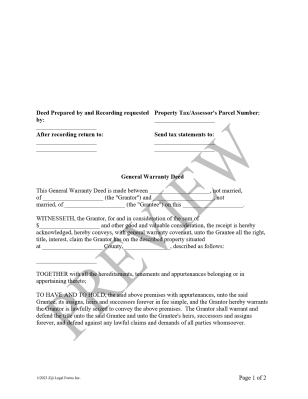Get started with your

Free Warranty Deed
A warranty deed is a legal document used to transfer interest in real property from the grantor to the grantee with warranty.
This document warrants a seller owns a piece of real estate or asset which is free of claims, liens, or encumbrances against their ownership, and guarantees the transaction from any title defects during the ownership of the grantor.
Click Create Document and let us get you started with your warranty deed. Just answer a few simple questions, revise as many times as you want and download your free PDF within minutes.

SIMPLE
STEPS
STEPS
Answer simple questions
Review and download your document
Print and sign instantly
